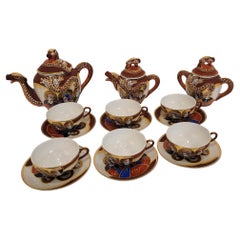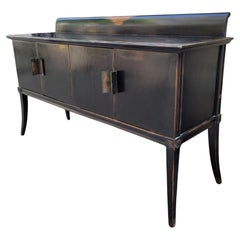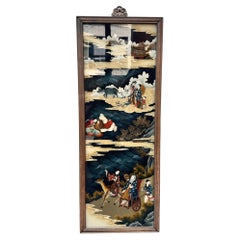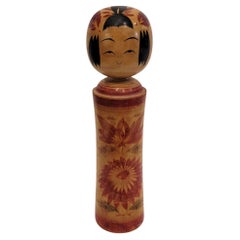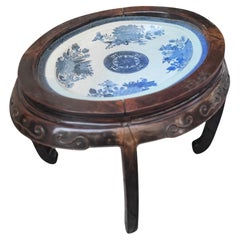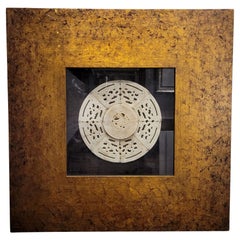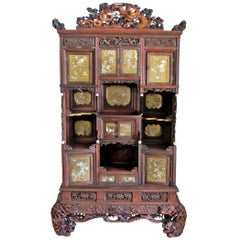Fragonard Interiors SL Asian Art and Furniture
to
5
12
11
1
1
1
3
7
1
1
6
1
1
4
1
7
7
4
4
3
8
7
4
2
2
12
12
12
2
1
1
1
Satsuma Red Gold Blue Satsuma Porcelain Tea Set, Nakasima Japan
By Satsuma
Located in Valladolid, ES
Gorgous and very Delicate six-piece tea or coffee set made of Japanese Satsuma porcelain. Cherry, blue, and ochre colors predominate. The main motif features the goddess Kannon surro...
Category
Antique Early 1900s Japanese Japonisme Ceramics
Materials
Gold
Japanese lacquered Black Cabinet , brass handles and woodcuts with orient
By Chow's Oriental Furniture Co.
Located in Valladolid, ES
Extraordinary Japanese Lacquered Sideboard with Antique Brass Handles and Woodcuts with Oriental Calligraphy
Exquisite cabinet in precious black lacquered wood with an antique effect...
Category
Early 2000s Spanish Japonisme Furniture
Materials
Bronze
Chinese Qing Reverse-Painted Mirror from the Qing Dynasty
By Chow's Oriental Furniture Co.
Located in Valladolid, ES
Stunning reverse-painted mirror from the 19th-century Qing Dynasty, depicting different scenes in a vertical narrative.
Different scenes with symbolic and auspicious elements frame r...
Category
Antique 1870s Chinese Qing Paintings and Screens
Materials
Crystal
Japanese Kokeshi Red Doll, polychrome wood Vintage
By Japan Sword Master Dziokazu
Located in Valladolid, ES
Amazing kokeshi doll, a traditional type of doll of Japanese origin. These dolls are handcrafted by kijishi (a term referring to local woodcarvers) and have a variety of meanings, ...
Category
Vintage 1940s Japanese Arts and Crafts Sculptures and Carvings
Materials
Wood, Paint
Tray table incorporating Chines Porcelain pattern, British East India Company
By Margaret Fitzhugh Browne
Located in Valladolid, ES
Technical data
Materials: Porcelain tray, wooden legs
Period: Qing Dynasty
Country of origin: China
Good condition for its age and use, with some flaws in the wooden structure
Overall dimensions: 70 x 95 x 80 cm
Porcelain dimensions: 70 x 58 cm
Exquisite Fitzhugh pattern porcelain plate or tray, inlaid in a cabinet that highlights its oval profile and raised on four slightly curved square legs.
The term "Fitzhugh" refers to a type of Chinese export porcelain produced primarily between 1780 and 1840, featuring blue and white designs. It originated with three members of two generations of the Fitzhugh family. Members of this family held important positions as ship captains and even as directors in the British East India Company. Within this company, high-ranking officials were allowed to engage in private trade. Between 1704 and the 1790s, porcelain pieces bearing this pattern were shipped to England.
The design usually includes a central medallion, although it is occasionally replaced by a coat of arms or monogram. The medallion is surrounded by four groupings of flowers representing the four seasons—peony for spring; lotus for summer; chrysanthemum for autumn; and prunus for winter—and symbols that typically represent the four virtues of the Chinese scholar: music, painting, logical thinking, and calligraphy. The design is framed with a decorative border that may be a lattice and spearhead pattern, sometimes known by the term "Nanking," or a more elaborate border featuring butterflies, honeycomb shapes, and floral ornamentation. The definition of the Fitzhugh porcelain...
Category
Antique 1790s Chinese Chinese Export Antiquities
Materials
Porcelain, Wood
Asian carved and framed green Bi Disc, jadeite
By Chow's Oriental Furniture Co.
Located in Valladolid, ES
Exquisite carved and framed jadeite bi disc (璧). A bi disc is a circular (flat) jade disc with a hole in the center, used in ancient China. In this case, it is composed of eight piec...
Category
Vintage 1940s Chinese Chinese Export Antiquities
Materials
Crystal, Jade
Japanese bronze sculpture “Horse in reverence”, Showa era
Located in Valladolid, ES
An Amazing sculpture made in bronze, in the Showa Era, in Japan. It represents a horse in a singular posture, with its front legs open, as if it were crouching or bowing. A moment o...
Category
Vintage 1930s Antiquities
Materials
Bronze
$1,424 Sale Price
42% Off
Hmong ethnic framed necklace, silver plated metal, Laos, Thailand
By S. Thailand
Located in Valladolid, ES
One of a kind and rarely seen ethnic necklace made of silver-plated metal, from Thailand. Recently framed in a large frame with floating glass. This is a piece that presents the esse...
Category
Vintage 1950s Thai Aesthetic Movement Antiquities
Materials
Metal, Silver Leaf
$1,730 Sale Price
20% Off
Japanese Black Cabinet Chrysanthemums, urushi-e lacquer Showa period
Located in Valladolid, ES
Stunning Japanese cabinet in lacquered wood, original from the Shōwa period. The Shōwa era (in Japanese, 昭和時代, literally "period of enlightened peace") or Shōwa period is the period ...
Category
Vintage 1940s Furniture
Materials
Wood, Giltwood, Lacquer
Chinese black green enamel flowers small water pipe opium pipe
By Dynasty Transorient
Located in Valladolid, ES
Amazing and beautiful Chinese cloisonné opium pipe, enamelled with loto flowers, character marks to the base, 28cm high
Astonishing opium pipe with mot...
Category
Antique 1890s Hong Kong Chinese Export Antiquities
Materials
Bronze, Enamel
$678 Sale Price
34% Off
Chinois green Bi Celadon Disc Sculpture, Mineral and forging
By Dynasty Transorient
Located in Valladolid, ES
Celadon Bi Disc Sculpture, Mineral and Forging, 20th century – China
Exquisite and sophisticated Bi disc made in the early 20th century in China. It is an extraordinary disc carved ...
Category
Vintage 1940s Chinese Qing Sculptures and Carvings
Materials
Stone, Wrought Iron
$755 Sale Price
20% Off
Japanese Meiji Dressing Stand with Mirror Black Lacquer
By Vintage Japanese Monochrome
Located in Valladolid, ES
Elegant and beautiful Dressing Table or it could be suitable for a jewellery box , Meiji Period ( 1868 - 1912 ).
Executed with black lacquer, holding a bronze hand mirror ( ekagami)
Configured with five smooth-running drawers of different Size. Two are equipped with slender "hirute"-shaped bail handles and three with decorative pull-rings.
The front-and backside featuring oval grips for easy transport.
Surmounted by a mirror frame in a shape reminiscent of a Shintô shrine torii-gate-
a twin-posted framework with a triangular crossbar flared in upswept Chinese-style gable ( Karahafu) endings.
Resting of the frame is the Japanese traditional handheld mirror with auspicious embossed design of wisteria ( fuji) and lovely patina.
Inscription on the right.
Considering its age the set is in a very good condition with some traces of usage and wear conform age.
Dimensions:
Dressing stand...
Category
Antique 1880s Dutch Meiji Antiquities
Materials
Bronze
$1,663 Sale Price
30% Off
Related Items
Satsuma Japanese Meiji Miniature Enameled Teapot Kozon Mark
By Satsuma
Located in Bishop's Stortford, Hertfordshire
An exceptional Japanese Satsuma miniature spool shaped pottery teapot and cover finely hand enameled with Kozon mark and dating from around 1880. This delightful teapot has an invers...
Category
Antique 19th Century Japanese Meiji Ceramics
Materials
Pottery
Japanese Carved and Lacquered Shibayama Cabinet, Meiji Period
Located in San Francisco, CA
An elaborate and finely detailed carved wood, and gold lacquered Shibayama cabinet (Chigaidansu). Having beautifully applied semi-precious stone and ...
Category
Antique 19th Century Japanese Meiji Furniture
Materials
Mother-of-Pearl, Wood
Modern Creative Kokeshi Doll by Hideo Ishihara, Japan
Located in Point Richmond, CA
Rare Modern creative Kokeshi doll by Hideo Ishihara, Japan
This rare whimsical sosaku kokeshi was created and signed by the award winning master, Hid...
Category
Mid-20th Century Japanese Mid-Century Modern Sculptures and Carvings
Materials
Wood
Antique Chinese Red Glazed Porcelain Vase with Porcelain Stand
Located in Brea, CA
Qing dynasty an antique important Chinese red glazed porcelain vase with porcelain stand, GuangXu Mark and of the period. Measures: 6.5” height 2.15 '' di...
Category
Early 20th Century Chinese Chinese Export Antiquities
Materials
Porcelain
Asian 19th Century Ningyo Doll
Located in Los Angeles, CA
Beautiful Asian 19th Century Ningyo doll. Great addition to your Asian inspired interiors and table tops.
Category
Antique 19th Century Japanese Other Antiquities
Materials
Cotton
Antique Large Chinese Export Reverse Painting on Mirror #2
Located in Norton, MA
A large charming late 19th-century to early 20th-century, Chinese export reverse mirror painting, depicting a lady playing a Chinese musical in...
Category
Antique Late 19th Century Chinese Paintings and Screens
Materials
Glass, Wood
Fine Dehua, Blanc de Chine, Quan Yin Porcelain Figure
Located in Dallas, TX
Blanc de chine porcelain seated figure of Quan Yin. Qing dynasty. Kangxi period.
Category
Antique Early 18th Century Chinese Qing Antiquities
Materials
Porcelain
Antique Black Lacquer Wedding Cabinet with Oversized Brass Medallion
Located in Yonkers, NY
An antique Chinese wedding cabinet from the early 20th century with black lacquer and large brass medallion hardware. Created in China ...
Category
Early 20th Century Chinese Cabinets
Materials
Brass
$4,800
H 65.5 in W 40.25 in D 22.5 in
17th Century Japanese Export Lacquer Cabinet with Depiction the Dutch Tradepost
Located in Amsterdam, NL
A highly important Japanese export lacquer cabinet with depiction of the Dutch East India Company tradepost Deshima and the annual Dutch delegation on its way to the Shogun in Edo
Edo period, circa 1660-1680
H. 88 x W. 100.5 x D. 54 cm
This cabinet includes a later European japanned stand, but also a modern powder-coated steel frame.
The latter can be designed and added to your specific needs.
The sides and front of the rectangular two-door cabinet are embellished in gold and silver hiramaki-e and takamaki-e on a black roiro lacquer ground with a continuous design. The two doors depict a long procession of numerous figures travelling on foot and horseback along buildings and a pagoda into a mountainous landscape. This is the annual court journey, Hofreis, of the Dutch from Nagasaki to the Shogun’s court in Edo. Three horseback riders are dressed as Dutch merchants and a fourth figure, probably het Opperhoofd, is seen inside a palanquin, norimon. Just about to cross the bridge, two men are carrying a cabinet like the present one.
Many Japanese figures on either side of the procession are engaged in various activities; some play musical instruments on board of small boats, others are fishing; figures inside buildings are depicted playing go, and farmers are tending to their rice paddocks. The upper part of the right door shows a large mansion, probably the local daimyo’s castle, with men kneeling before a man in the central courtyard.
The court journey fits in with the foreign policy of the shogunate which accorded a role to the VOC alongside China, Korea, and the Ryukyu Islands who also had to pay tribute. However, the VOC employees were traders, having low status in Japan’s social hierarchy, and they were received with less deference than were the state embassies from Korea and the Ryukyu Islands. Nevertheless, the contacts with the Dutch were a welcome source of information to the Shogun about Europe and European science and technology.
The left side of the cabinet depicts, in mirror image, a rare view of the artificial fan-shaped Deshima Island, the trading post for the Dutch in Japan. The island, where the Dutch flag flies, is surrounded by small Japanese boats and an anchored three-masted fluyt (cargo ship), flying Dutch flags, with on the stern the VOC monogram. On the bottom right a busy street of Nagasaki is shown, bordered by shops and leading up to the stone bridge. On the island the trees are beautifully painted, two cows can be seen, and the flagpole, all in very fine detail. Dutchmen and enslaved Malay are visible outside the buildings and two Japanese figures, probably guards, sit in a small hut in the centre.
A maximum of fifteen to twenty Dutchmen lived on the island at any time and soldiers or women were not allowed. Restrictions on Deshima were tight, and the merchants were only allowed to leave the island by special permission. The Opperhoofd had to be replaced every year, and each new Opperhoofd had to make a court journey to pay tribute, present gifts, and to obtain permission to Margaret Barclay eep on trading. In the distance, many birds fly above the hills and a four-story pagoda can be seen. The right side of the cabinet is painted with other horse riders and their retinue journeying through mountains.
The pair of doors to the front open to reveal ten rectangular drawers. The drawers are decorated with scenes of birds in flight and landscapes with trees and plants. The reverse of the left door with two thatched buildings, one with a ladder, underneath a camelia tree with large blooms; the right door with a three-story pagoda nestled among trees and both doors with a flying phoenix, ho-oo bird. The cabinet, with elaborately engraved gilt copper mounts, hinges, lock plates and brass handles, is raised on an 18th-century English japanned wood stand.
A pair of large cabinets...
Category
Antique 17th Century Japanese Edo Lacquer
Materials
Copper, Gold
$1,493,854
H 34.65 in W 39.57 in D 21.26 in
Rare Meiji Period Japanese Lacquer Cabinet
Located in West Palm Beach, FL
Large, rare and important Meiji period, late 19th century, Japanese lacquer cabinet
Meiji period (1868-1912)
19th century
In three parts, desi...
Category
Antique 19th Century Furniture
Materials
Wood
Japanese Porcelain, Satsuma Tea Set, 23 Pieces
By Japanese Studio
Located in Milano, IT
...
Category
Vintage 1950s Japanese Japonisme Tea Sets
Materials
Porcelain
Chinoiserie Black Lacquered Cabinet on Stand
Located in Kastrup, DK
Chinese Qing dynasty cabinet with original chinoiserie decorations rasied on later stand.
Cabinet elaborately decorated with flowers paint...
Category
Antique Early 19th Century Chinese Qing Furniture
Materials
Metal
